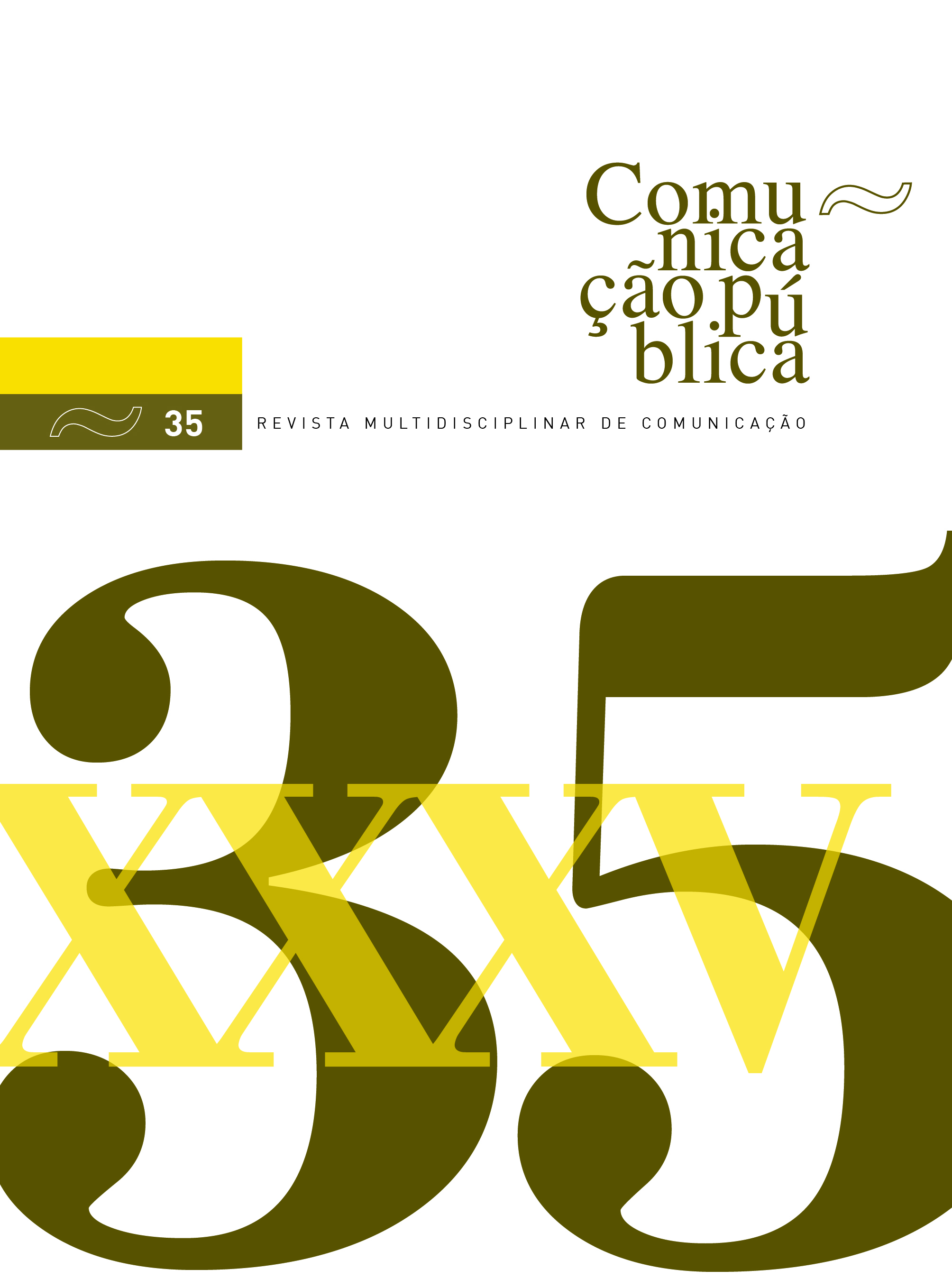Journalism in Film
journalism representations in Hollywood (2010-2022)
DOI:
https://doi.org/10.34629/cpublica.789Keywords:
journalism in cinema, representations of journalism, Hollywood cinemaAbstract
Similar to what happens in literature, cinema has also observed, throughout the twentieth and twenty-first centuries, with “a critical and fascinated eye” the universe of journalism and the media. Mário Mesquita, a reference of Media Studies in Portugal, points out that Hollywood cinema has been one of the main sources of representation of journalism in Western popular culture, constituting itself as “an inexhaustible reservoir of romantic mythologies (positive or negative) about the media, the press and the profession of journalist” (Mesquita, 2003). In turn, the critic João Bénard da Costa (1993) even mentions that journalism has become one of the main sources of American fiction. According to Brian McNair, cinema is a medium that produces myths in our society, so films about journalism are the space in which societies articulate, explore and interrogate journalistic values and criticize the application of these same values by the journalistic media themselves and also the relationship between the powers that be and journalism (McNair, 2010).
In this article, we intend to understand how journalism and the journalist have been represented by cinema, namely by Hollywood productions in the last decade, having as a leading reference the thought of Mário Mesquita. In this sense, we consider the films that have journalistic practice as central to their narrative: Nightcrawler (2014); Spotlight (2015); Truth (2015); Shock and Awe (2017); The Post (2017); e She Said (2022).
Downloads
References
Baptista, C. (2016). O jornalismo, o método e o filme Spotlight. Público.https://www.publico.pt/2016/02/01/culturaipsilon/opiniao/o-jornalismo-o-metodo-e-o-filme-spotlight-1721877.
Barthes, R. (1957). Mitologias. Edições 70.
Bénard da Costa, J. (1993). Com benefício de dúvida: O poder da imagem ou a imagem sem poder. In Jornalismo e Cinema (pp. 13-19). Expresso – Cinemateca Portuguesa.
Camponez, C. & Oliveira, M. (2021). Representações do jornalismo e dos jornalistas. Mediapolis, 13, 5-13. https://doi.org/10.14195/2183-6019_13_0.
Cardoso, J. A. (2022). Ela Disse – o filme sobre começar uma revolução a partir da violação. Ípsilon – suplemento do jornal Público, 16-17.
Carey, J. W. (1988). Taking culture seriously. In J. W. Carey (Ed.), Media, myths, and narratives. SAGE.
Dahlgren, P. (1992). Introduction. In P. Dahlgren & C. Sparks (Ed.), Journalism and popular culture. SAGE.
Drohan, M. (2016). Spotlight and investigative journalism: How the film reinforces the essential role of a free professional press in a democracy. The Serials Librarian, 71(3-4), 212-220. https://doi.org/10.1080/0361526X.2016.1237403.
Ehrlich, M. C. (1997). Journalism in the movies. Critical Studies in Media Communication, 14(3), 267-281. https://doi.org/10.1080/15295039709367015.
Ehrlich, M. C. (2004). Journalism in the movies. University of Illinois Press.
Ehrlich, M. C. (2006). Facts, truth, and bad journalists in the movies. Journalism, 7(4), 501-519. https://doi.org/10.1177/1464884906068364.
Ehrlich, M. C. & Saltzman, J. (2015). Heroes and scoundrels: The image of the journalist in popular culture. University of Illinois Press.
Ferreira, M. C. (1993). O jornalista como personagem. In Jornalismo e Cinema (pp. 44-47). Expresso – Cinemateca Portuguesa.
Godinho, J. (2018). Repórteres e cineastas: o medo da ficção. Electra, 4, 61-72.
Good, H. (1989). Outcasts: The image of journalists in contemporary film. Scarecrow Press.
Kovach, B. & Rosenstiel, T. (2005). Os elementos do jornalismo: O que os profissionais do jornalismo devem saber e o público exigir. Porto Editora.
Luhman, N. (2000). The reality of mass media. Polity Press.
McNair, B. (2010). Journalists in film – Heroes and villains (1.ª ed.). Edinburgh University Press.
McNair, B. (2011). Journalism at the movies. Journalism Practice, 5(3), 366-375. http://dx.doi.org/10.1080/17512786.2011.564885.
Mendonça, L. (2018). Jornalismo: como produzir uma notícia. À Pala de Walsh. https://apaladewalsh.com/2018/01/jornalismo-como-produzir-uma-noticia/.
Mesquita, M. (2003). O quarto equívoco – O poder dos media na sociedade contemporânea (1.ª ed.). MinervaCoimbra.
Mesquita, M. (2004). Quando o Superman se disfarça de Clark Kent. Público, 8.
Mesquita, M. (2010). Michael Schudson: o sociólogo historiador. In M. Mesquita (Ed.), Cidadania e Jornalismo (pp. 11-16). Fundação Luso-Americana para o Desenvolvimento.
Mesquita, M. (2013). Katharine Graham, a Senhora Imprensa. In M. Mesquita, O estranho dever do cepticismo (pp. 46-49). Tinta-da-China.
Pacheco, N. (2018). Quando o cinema volta ao jornalismo. Público. https://www.publico.pt/2018/02/15/culturaipsilon/opiniao/quando-o-cinema-volta-ao-jornalismo-1802863.
Painter, C. (2019). Fictional representations of journalism. Oxford Research Encyclopedia of Communication. http://dx.doi.org/10.1093/acrefore/9780190228613.013.811.
Sá, S. d. (2017). De herói a vilão: representações maniqueístas do repórter em Spotlight e Nightcrawler. In J. R. Carvalheiro (Ed.), Facetas do repórter: narrador e narrado (pp. 73-98). LabCom.IFP.
Schudson, M. (1991). The sociology of news production revisited. In J. Curran & M. Gurevitch (Eds.), Mass media and society. Arnold.
Schudson, M. (1992). Watergate in American memory. Basic.
Tuchman, G. (1993 [1972]). A objectividade como ritual estratégico: Uma análise das noções de objectividade dos jornalistas. In N. Traquina (Ed.), Jornalismo: Questões, teorias e "estórias" (pp. 74-90). Vega.
Vieira, J. (1993). Mr. Gutenberg goes to Hollywood (o real e a ficção no cinema sobre jornalismo). In Jornalismo e Cinema (pp. 21-24). Expresso – Cinemateca Portuguesa.
Zelizer, B. (2004). Taking journalism seriously. SAGE.
Downloads
Published
Issue
Section
License
Copyright (c) 2023 Direitos do Autor (c) 2023

This work is licensed under a Creative Commons Attribution-NonCommercial 4.0 International License.
Os conteúdos da Comunicação Pública estão licenciados com uma licença Creative Commons - Atribuição-NãoComercial 4.0 Internacional.


